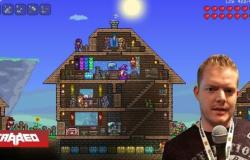When Justin Trudeau meets Joe Biden at the G7 summit in Italy this week, Trudeau is unlikely to ask whether the United States is at risk of civil war in the coming years.
A think tank within the Trudeau government is already considering this possibility.
In a spring report titled “Disruptions on the Horizon,” an office known as Policy Horizons Canada proposed the American civil war as a scenario for which Ottawa should prepare. This hypothesis was hidden in the middle of the 37-page document, which outlined the possibility in 15 words: “U.S. “Ideological divisions, democratic erosion and internal unrest increase, plunging the country into civil war.”
It wouldn’t be the first time that this could happen.
There has been no shortage of apocalyptic predictions about American politics since the Trump era. Since the 2016 elections, various left-leaning organizations, political consultants and academics have carried out speculative exercises and simulations, ostensibly to defend democracy. In practice, much of this has been self-congratulatory. One notable episode in 2020 included a simulation that ended with Biden and his allies encouraging the entire West Coast to secede from the union.
The Policy Horizons report feels different: not a dark fantasy of American partisans, but a sober analysis of a friendly foreign government contemplating our national crisis. So how seriously should this be taken on both sides of the 49th parallel?
Other scenarios in that category included the proliferation of homemade biological weapons, the rise of antibiotic-resistant pathogens causing mass deaths and food shortages, and the outbreak of World War III.
Still, it’s an unlikely scenario.
John McArthur, a scholar at the Brookings Institution and a member of the Policy Horizons steering committee, said the report’s depiction of the American Civil War could reflect deep Canadian anxiety about American politics, rather than a literal concern about a war-style war. 1861.
Emphasizing that he was speaking in a personal capacity, McArthur noted that the rise of American protectionism and isolationism during the Trump administration had shaken the Canadian psyche and upended decades-long economic relations. Donald Trump’s policies and personal behavior toward Canada (including criticizing Trudeau after a G7 meeting in Quebec) have left a painful mark.

Many of the scenarios in the report pointed to the urgency of mastering new technology: the threat of cyberattacks disabling critical infrastructure, for example, or emergency services being overwhelmed to the point of collapse. A government could adjust its priorities in light of these ideas.
Most contemporary civil wars – in Yemen or Sudan, for example – are not useful references for the United States. They involve weak governments in poor countries, often with destabilizing interference from neighboring regimes.
But why is Canada suspicious of this event?
There is a credible scenario for the American Civil War, not from the distant past or from distant lands, but from a recent and near example: Canada itself.


This was a period of brutal and traumatic civil conflict, and in a world like today it is not wild speculation to imagine a similar sequence of events in the United States. This is a heavily armed country with a questioned federal system and proud and powerful provincial identities. Some of its states, such as Texas and California, are already quasi-national entities. The next president will surely be hated by much of the country and probably seen as illegitimate by at least a large minority.
Has that thought crossed Justin Trudeau’s mind? His tenure as prime minister is itself a legacy of that period: it was in part by confronting Quebec militants with a “look at me” resolve that Trudeau’s father, Pierre Trudeau, became a dominant figure in politics. modern Canadian: the kind of leader who could found a dynasty. Justin Trudeau may not need a think tank to tell him that roiling anger across the border is a threat to North American stability.
But he is not his father and this is not Canada’s crisis. They are neighbors and spectators, and for now they have a different role: simply observing.
You may be interested: The United States lifts the ban on sending weapons to the Ukrainian military unit Azov
Source: Politico








